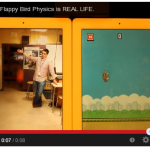Periodically, some scientific celebrity from the physical sciences-- Neil deGrasse Tyson or Stephen Hawking, say-- will say something dismissive about philosophy, and kick off a big rush of articles about how dumb their remarks are, how important philosophy is, and so on. Given that this happens on a regular basis, you might wonder why it is that prominent physicists keep saying snide things about philosophy. But never fear, the New York Times is here to help, with an op-ed by James Blachowicz, an emeritus philosopher from Loyola, grandly titled There Is No Scientific Methods.
It's actually…
humanities
When I was going through the huge collection of photos I have from the Forum in Rome, I kept running across pictures containing two young Asian women (neither of them Kate). This isn't because I was stalking them, but because they were everywhere, stopping for long periods in front of virtually every significant ruin and striking exaggerated poses for each other to take photos of. I had to carefully frame a few of my own photos to avoid them, but I did also take a few that deliberately included their posing, because it was so amusingly over the top.
Tourists taking photos of each other in…
I got off on a bit of a rant the other day about bad defenses of "the humanities," but there's a bright side. It finally got me to write my own, over at Forbes, which is basically the last piece of a tetralogy of advice for students:
-- Why small colleges are a great place for students majoring in STEM subjects
-- What students planning to major in STEM subjects should make sure to do in college
-- Why non-STEM majors should nevertheless take science classes in college
-- Why STEM majors should take "humanities" classes, and take them seriously
That last one, posted yesterday, is my attempt…
Engaging in a bit of tab clearance before I head off to DAMOP tomorrow afternoon, I noticed that I still had How to Teach an Ancient Rape Joke open. This is because while I found it kind of fascinating, it's not all that directly relevant to what I do, and I didn't have anything all that concrete to say beyond "Huh. That's interesting." So it languished in one of the many, many open tabs cluttering up Chrome, too interesting to just close but not anything I could see a clear angle to comment on. And eventually it was sort of forgotten until I set about paring down open tabs before an out-of-…
Two roads diverged in a yellow wood, And caused me no small amount of panic For traveling both of them would be good But there simply was no way I could Until I remembered quantum mechanics.
So half my wavefunction I sent left And rightward steered the other half Both pieces of me with equal heft And thanks to calculations deft, I knew the end would sum both paths
Plenty of physicists claim to know Or at least will confidently speculateThat collapse, or a pilot wave's flow, Or decoherence act to make it so. Me, I just shut up and calculate.
So in the woods I went two ways To return together…
As previously mentioned, SteelyKid has started to get into pop music. In addition to the songs in that post, she's very fond of Katy Perry's "Roar," like every other pre-teen girl in the country, and also this Taylor Swift song:
I've seen a bunch of people rave about this, but honestly, I found it pretty forgettable until I read Jim Henley's Twitter exegesis in which he shows that the song is really about the tryst with an alien that left Swift with a faceless hybrid infant. That is, a blank space-baby. Now I can't get the idiot song out of my head.
Anyway, a week or two ago, I actually went…
Back on Thursday when I was waiting to be annoyed by a speech, one of the ways I passed time was reading stuff on my phone, which included This Grantland piece about Charles Barkley and "advanced stats". In it, Bryan Curtis makes the argument that while Barkley's recent comments disparaging statistical tools seem at first like just the same old innumeracy, it's really a question of ownership.
But Barkley was firing a shot in a second war. Let’s call it Moneyball II. This clash doesn’t pit a blogger versus a newspaperman in a debate over the value of PER. It pits media versus athletes in a…
Yesterday was Founders Day at Union, celebrating the 220th anniversary of the granting of a charter for the college. The name of the event always carries a sort of British-boarding-school air for me, and never fails to earworm me with a very particular rugby song, but really it's just one of those formal-procession-and-big-speaker events that provide local color for academia.
This year's event started, as always, with a classical music performance-- a song by Aaron Copeland, this time, so we've at least caught up to the 20th Century. (I'm not sure I want to live long enough to see a Bob Dylan…
Yesterday's Open Letter to Neil deGrasse Tyson struck a chord with a lot of people, and has spread a good distance on social media, which is gratifying. Given the delocalized nature of modern social media, though, it means I'm having essentially the same argument in five different places via different platforms. In the interest of consolidating this a tiny bit, then, let me post some follow-up stuff here.
-- The most charitable interpretation of the tweet I objected to is that it's meant as praise for good students. The idea being that good students will learn in the absence of good teaching…
Given that I am relentlessly flogging a book about the universality of the scientific process (Available wherever books are sold! They make excellent winter solstice holiday gifts!), I feel like I ought to try to say something about the latest kerfuffle about the scientific method. This takes the form of an editorial in Nature complaining that Richard Dawid and Sean Carroll among others are calling for discarding traditional ideas about how to test theories. Which is cast as an attempt to overthrow The Scientific Method.
Which, you know, on the one hand is a kind of impossible claim. There…
The winter solstice holidays are a time for family and togetherness, so building off yesterday's post about the great Marie Skłodowska Curie, we'll stay together with her family. Specifically her daughter Irène Joliot-Curie and her husband Frédéric. The Joliot-Curies are possible answers to a number of Nobel Prize trivia questions-- only mother and daughter to win, one of a handful of married couples, etc.-- but the scientific story about them that I find most fascinating is that their Nobel was for the third thing they did that could've earned them the prize, after they just missed out on…
Last week Kate pointed me to this post about heroic stories of science saying "This seems relevant to your interests." And, in fact, a good deal of the post talks about Patricia Fara's Science: A Four Thousand Year History, the Union library's copy of which is sitting on my desk, where I had looked something up in it just that morning. (Specifically, the part where Fara notes that the distinction between "science" and "technology" is largely a class-based fiction, dividing high-status philosophers from grubby practical mechanics.)
There are a bunch of things going on in this, and most of them…
Two language-related items crossed in the Information Supercollider today: the first was Tom's commentary on an opinion piece by Robert Crease and Alfred Goldhaber, the second Steven Pinker on the badness of academic writing.
All of them are worth reading, and I only have small dissents to offer here. One is that, unlike Tom and Crease and Goldhaber, I'm actually just fine with the popular usage of "quantum leap" for a particularly dramatic change. Yes, I realize that the canonical "quantum jump" is the smallest possible change, but I think that's putting too much emphasis on only one aspect…
Also coming to my attention during the weekend blog shutdown was this Princeton Alumni Weekly piece on the rhetoric of crisis in the humanities. Like several other authors before him, Gideon Rosen points out that there's little numerical evidence of a real "crisis," and that most of the cries of alarm you hear from academics these days have near-perfect matches in prior generations. The humanities have always been in crisis.
This wouldn't be worth mentioning, but Rosen goes on to offer an attempt at an explanation of why the sense of crisis is so palpable within the humanities, an explanation…
The physics vs. philosophy slow-motion blogfight continues, the latest major contribution being Sean Carroll's "Physicists Should Stop Saying silly Things About Philosophy. I've been mostly trying to stay out of this, but when I read through the comments at Sean's post to see if anybody offered any specific examples of problems that could've been avoided by talking to philosophers, I was kind of surprised to find a lot of people talking up Niels Bohr. (Likewise Ashutosh Jogalekar's Philosophy Begins Where Physics Ends....) If you're trying to talk up the virtues of philosophy over "pure"…
I alluded to this on Twitter, and meant to leave that be, but the other thing I was going to blog today didn't come together, and I probably shouldn't leave a cryptic tweet as my only comment. So...
One of the links getting passed around a lot in my social-media circles is this Tumblr post from Ben Lillie on The Humanities of Science Communication, which argues that discussions of the science of communication often seem to ignore the expertise of people who communicate for a living-- playwrights, actors, journalists, etc. This is a good point, but the post as a whole bugged me a bit, because…
One of the more annoying points of contention back in the days of the Sokal hoax and the "Science Wars" was an argument over social construction. This is, loosely speaking, the idea that our understanding of the world is not strictly rational and objective, but is heavily influenced by interactions with other people, and the culture in which we live. The idea originally arose in literary academia, but expanded to be applied to basically everything, including science.
At bottom, this is probably the best and most useful idea to come out of whatever collective "-ism" you want to use to refer…
On the bright side, I'm unlikely to read anything more stupid and insulting today than this Inside Higher Ed article arguing that it would be wrong to shrink graduate programs in English, because the higher education market is Special:
When you shrink graduate student enrollments (the supply side), you inevitably also shrink the size of graduate programs, which means, willy-nilly, that you decrease tenured faculty lines (the demand side) because they are the folks teaching in grad programs. Administrators would be happy to shrink our programs and eliminate some tenured lines through…
The posts on box-checking and liberal arts teaching generated a fair number of comments that I haven't really had time to address individually, across a few different social media platforms. So I'm going to collect some of the more important stuff here, in one catch-up post.
--A few people, mostly in places that aren't conducive to linking, raised versions of "You never know what will be useful" as a justification for having a list of boxes to check. And I don't entirely disagree with that. I'm not against the idea of forcing students to take a broader range of stuff than they otherwise might…
As a follow-up to yesterday's post about liberal education and the failure modes thereof, I thought I should try to do something constructive and make suggestions regarding how you might go about a "poetry for physicists" kind of thing. After all, one of the things I find intensely frustrating about a lot of "crisis in ____" discussions is the lack of specific suggestions, so throwing out a "here's a problem, good luck with that" post would be suboptimal behavior on my part. This required some reflection on the question of just what I got out of my "liberal arts" classes back in the day--…




